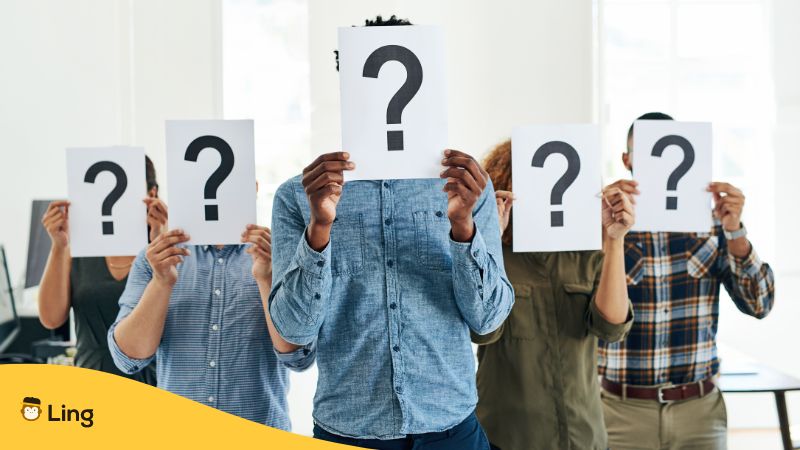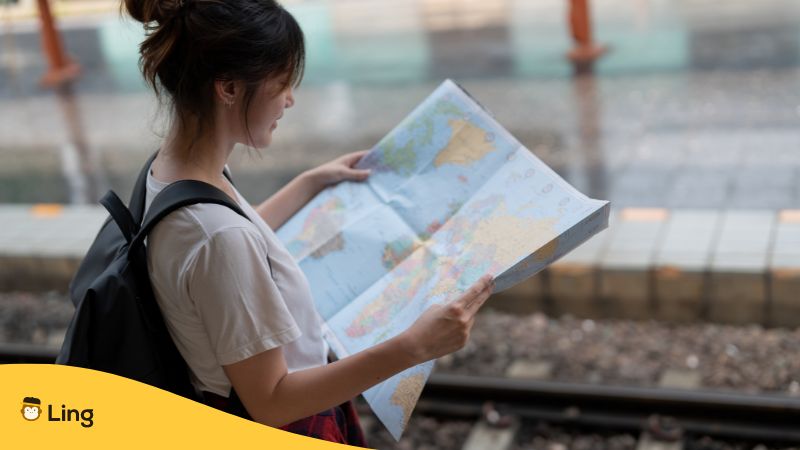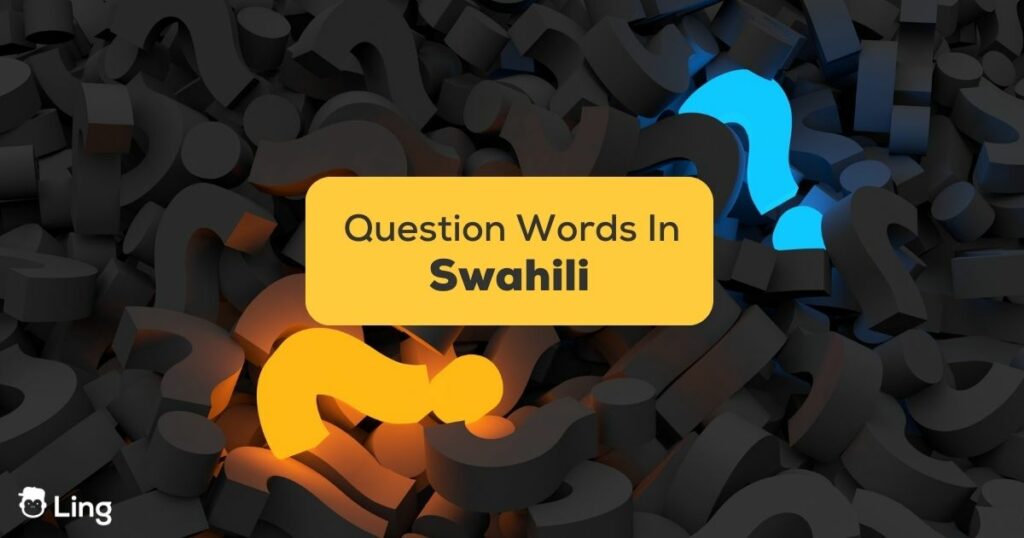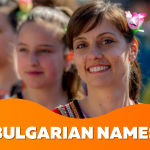We’ve all been there – in a new exotic land, wide-eyed and enamored by our surroundings, with locals overflowing with friendliness. Yet, something stops our full immersion: the language barrier. In this post, we’ll go over the simple question words in Swahili so that you can construct your interrogative sentences like a pro! Let’s begin!
Ever been lost in a foreign city, with no GPS signal, desperately wishing you could ask for directions in the local language? Or maybe you’ve found yourself browsing a bustling market, with the tantalizing aroma of unknown dishes tickling your nostrils, but you don’t know how to ask, “What’s cooking?” That’s where understanding the question words swoops in like your favorite superhero!
Much like an adventurer’s essential toolkit, question words are a traveler’s secret weapon. While phrases like “Hello” and “Thank You” are handy icebreakers, it’s the good ol’ “Who, What, Where, When, Why, and How” that truly unlock meaningful interaction with locals. You can dive headfirst into delicious regional delicacies, uncover the best-hidden gems (who needs a tourist trap?), and, more importantly, weave compelling travel tales rich with local color.
Now, wouldn’t that transform you from a mere spectator to an active participant in your travel adventures? And all this magic unravels simply by mastering the question words. So, readers, put on your explorer’s hat, grab that phrasebook and gear up to learn your question words in Swahili or any other language on your travel list.
The Foundations Of Question Words In Swahili
You see, Swahili is an agglutinative language. That’s a fancy linguistic term that means that words or grammatical features are expressed by attaching different affixes (prefixes or suffixes) to a root word. So where English uses different words, Swahili often uses different forms of a single word. Think of it like a word Lego set – by swapping out and rearranging the individual bricks, you can create an endless variety of structures.
When it comes to question words in Swahili, there’s a recurring character: the Swahili version of a ‘question mark’, the word -ni. This versatile affix attaches to various roots to create a host of question words. The magic of -ni puts the ‘question’ in your question, much like how a cherry adds the necessary ‘pop’ to a sundae. Whether it’s asking “who” (nani), “where” (wapi), or “why” (kwa nini), you’ll find this trusty companion right there.
Let’s get to know each other in detail below!

Nani: Who
When you desperately need to find the person responsible for eating the last piece of fried plantain, you’ll need this gem: nani. That’s right; the word for “who” in Swahili is as catchy as the famous ABBA song. So, you’ll never forget to ask, “Nani amekula mihogo yangu?” (Who ate my cassava?)
- Nani alitengeneza hiki kiti cha enzi?
Translation: Who crafted this magnificent throne? - Nani atahudhuria sherehe hii ya ngoma?
Translation: Who’s attending this exhilarating drum party? - Nani ametupatia zawadi hizi za kipekee?
Translation: Who blessed us with these unique gifts?
Nini: What
When deciphering the Swahili code, nini has your back. “What” can be easily translated to this straightforward term. If you’re curious about the title of that catchy Taarab song, go ahead and ask, “Wimbo huu unaitwa nini?” (What is the name of this song?)
- Chakula hiki kina ladha ya nini?
Translation: What flavor dances through this divine dish? - Hii ndio njia ya kwenda wapi eh, nini?
Translation: This path leads… where, exactly, my friend? - Nini kilitokea usiku wa kipekee wa matango ya bluu?
Translation: What occurred on that fateful night of the blue cucumbers?

Wapi: Where
While continuing our quest for linguistic knowledge, we stumble upon wapi – the unshakable “where” of Swahili. When you simply must locate the nearest place to savor a delicious Simba Rojo mocktail, “Nyumba ya kunywa Simba Rojo iko wapi?” (Where is the Simba Rojo drinking house?) will be your new go-to phrase.
- Tunaweza kupata wapi viatu vya kuogelea na kichwa cha nyuki?
Translation: Where can we acquire swimming shoes and a beekeeper’s hat? - Wapi nitakuta mkahawa wenye kinywaji kitamu cha chai ya maziwa ya Tembo?
Translation: Where will I discover a café concocting the scrumptious Elephant Milk Tea? - Ufukwe wenye michirizi mikubwa wa pwani yuko wapi?
Translation: Where does the beach with colossal shoreline ridges reside?
Lini: When
Time waits for no one, and neither does the word for “when” in Swahili: lini. Use this trusty term for nailing down elusive details. “Tukio hili litafanyika lini?” (When is this event happening?) is sure to become a staple in your Swahili questioning toolkit.
- Lini tamasha la mwaka wa mapinduzi ya paka litafanyika?
Translation: When does the annual feline revolution festival commence? - Mkutano wetu wa siri wa wapenzi wa ndizi utakuwa lini?
Translation: When will our clandestine banana-enthusiasts meeting transpire? - Mvua za mawe zitaanza lini kwenye bonde la miale?
Translation: When shall the hailstorms commence in the valley of rainbows?
Kwa Nini: Why
Ah, kwa nini – the grand seeker of wisdom. Simply put, “why” in Swahili asks for the deeper meaning behind our actions. So, when life presents you with tropical fruits and you find yourself inquiring why oranges are green in Zanzibar, go ahead and ask, “Kwa nini machungwa ya Zanzibar ni ya kijani?” (Why are Zanzibar oranges green?)
- Kwa nini sanamu hii ina vichwa saba vya sungura?
Translation: Why does this statue boast seven rabbit heads? - Kwa nini ndege huyu anaimba wimbo wa opera?
Translation: Why does this bird serenade us in a sumptuous operatic melody? - Kwa nini watu hucheza soka na kofia za wachawi?
Translation: Why do people play soccer wearing wizards’ hats?

Vipi: How
Finally, we’ve arrived at the pièce de résistance: vipi. Bringing “how” into the Swahili lexicon, this word unlocks the technique behind it all. Want to know how to order a Tanzanian specialty like ugali? Just ask, “Ninaweza kuagiza ugali vipi?” (How can I order ugali?) Voilà! The power of vipi is now in your hands.
- Vipi ninaweza kufuzu kujiunga na shule ya uchawi ya wageni?
Translation: How may I qualify for the esteemed International School of Sorcery? - Vipi tunaweza kutembelea visiwa vya siri vya malaika baharini?
Translation: How can we venture to the enigmatic Islands of the Sea Angels? - Jiko hili la maajabu linapika vipi vyakula vya kushangaza?
Translation: How does this miraculous kitchen prepare such astonishing cuisine?
Learn Swahili With Ling
Voilà! Equipped with these powerful example sentences, Swahili questioning has just become as easy as serenading a savannah tortoise. Go forth and conquer your Swahili conversations with the verve of a linguistic virtuoso! But wait! Are you interested in learning this language? If yes, we’ve got the best resource for you: Ling!
With Ling, the fascinating African vernacular is no longer a foreign landscape but an adventurous playground. Just like a journey across the Serengeti, Ling’s language-learning voyage promises excitement mixed with insightful discoveries, using an approach that is engaging yet educational. The app combines engaging game-like elements with comprehensive language basics, turning what might have seemed like a daunting Mt. Kilimanjaro ascent into a walk in a serene national park with rare wildlife sightings.
Ranging from those crucial question words we’ve just uncovered to gripping grammar and vivacious vocabulary, Ling’s got you covered for every step of your Swahili learning journey. Give it a try now by downloading it from the App Store or Play Store now!



































































